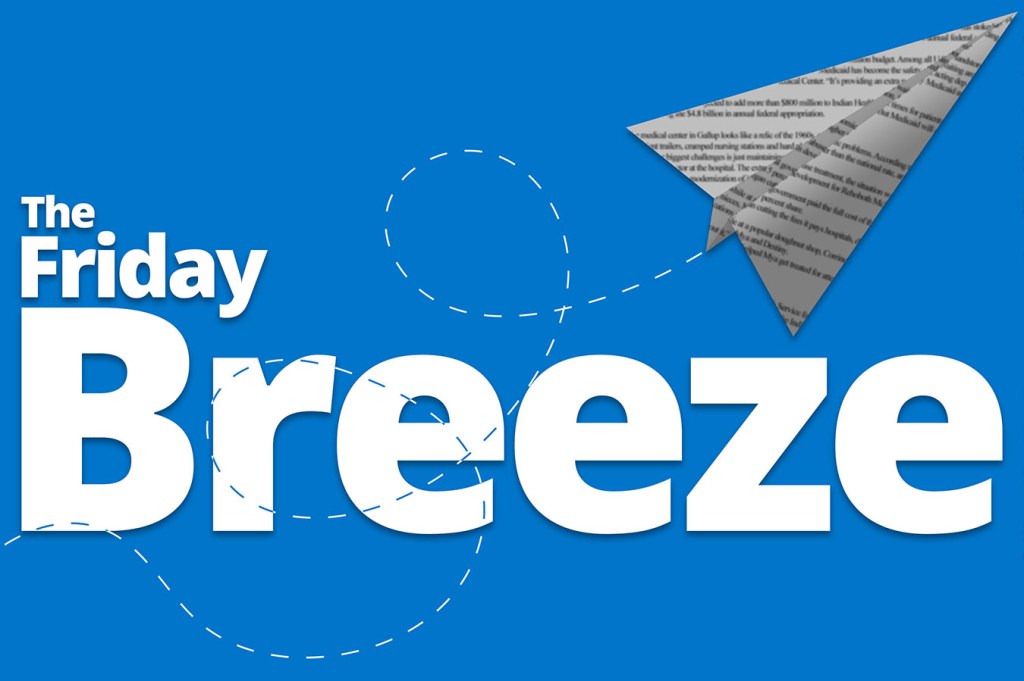Happy Friday! Welcome to the inaugural edition of KHN’s Friday Breeze. As the newsletter editor at Kaiser Health News, I read hundreds of health stories a week, and I’m here each Friday to sum up the more important ones — interesting reads, news that will have lasting impact, unique takes on the big problems in the industry. I wade through them so you don’t have to.
So here’s what you need to know from this week.
The big news is that the official enrollment numbers for the health law came in, and despite the gloom and doom predictions from the fall, they’re only slightly down from last year. (We already knew this, but now it’s official!) The “list price” on premiums are up, but because of a weird glitch with how subsidies now work (since President Donald Trump cut off payments to insurers) a lot of people are actually paying less. That seems dandy now, but experts are worried about the lasting ramifications of what’s known as “silver loading” (aka more people buying into that middle tier and ending up with free or very cheap plans). While things are working well at the moment, some warn there’s a reckoning coming. Meanwhile, Democrats hope a different kind of reckoning is coming with the midterms. Here are some of the top stories:
- The New York Times: The Final Obamacare Tally Is In. About 400,000 Fewer People Signed Up This Year.
- The Associated Press: Premiums Shoot Up, But Many Are Paying Less For ‘Obamacare’
- Modern Healthcare: Is Silver-Loading The Silver Bullet? Actuaries Wary Of Long-Term Impact Of CSR Cutoff
- Bloomberg: Democrats Aim To Turn Obamacare Into Asset From Burden In 2018
There was a lot of movement on the opioid crisis this week: from the surgeon general making a rare public health advisory that loved ones of those with an addiction should be carrying anti-overdose medication in the same vein as learning CPR; to studies linking looser marijuana laws and less opioid prescriptions; to Food and Drug Administration chief Scott Gottlieb imploring the “internet ecosystem” to step up to curb the tide of illegal drugs. We’re also going to see a lot of focus on the issue in Congress as lawmakers work toward a package they want to get to the floor in May — which would give both sides a win they could talk up in the fall while campaigning for the midterms.
- NPR: Surgeon General Urges More Americans To Carry Opioid Antidote
- The Washington Post: FDA Commissioner Calls On Internet Providers To Help Police Opioid Offerings
- The Associated Press: Studies Link Legal Marijuana With Fewer Opioid Prescriptions
- The Hill: GOP Panel Proposes Lifting Medicaid Limits On Opioid Care
In industry news, the potential merger between Walmart and Humana is making people nervous — namely, hospitals that are still reeling from other proposed acquisitions and new major players entering the landscape.
- The Wall Street Journal: Hospitals Fear Competitive Threat From Potential Walmart-Humana Deal
- The Wall Street Journal: Walmart-Humana Talks Put New Pressure On Remaining Players In Health Care
Over in pharmaceutical land: Some are worried that the China tariffs could contribute to the already daunting problem of skyrocketing drug prices; and check out this fascinating profile on two men who crisscross the country and leave higher prices in their wake.
- Stat: Will The Trump Tariffs On China Raise Drug Prices For Americans?
- Bloomberg: When These New Pharma Bros Show Up, Drug Prices Tend To Go Monumentally Higher
If you haven’t been following Stat’s coverage of the National Institutes of Health-alcohol story, you’re missing out. An investigation revealed that NIH researchers were wooing the alcohol industry to fund a study that showed the benefits of moderate drinking. But the reporters have continued to dig deeper and have found more layers of ethical complexity.
- Stat: NIH Rejected Study Of Alcohol Advertising While Pursuing Industry Funding
- Stat: New Alcohol-Advertising Research Stopped With NIH Branch Director’s Arrival
Although the story has been resolved, I want to flag BuzzFeed’s investigation into Grindr sharing its users’ HIV statuses with outside companies. The app decided it would no longer provide that data, maintaining that the furor around it was a “misunderstanding of technology.” Either way, it shines a light on the vulnerabilities of putting health care information into public forum-esque apps.
And some other news to watch out for: Despite voters OK’ing Medicaid expansion, Maine’s governor is refusing to apply for federal funding, insisting that lawmakers figure out a way to pay for it; a look at how an office that deals with refugees has become a battleground for abortion; in California, it’s the single-payer-or-bust die-hards versus the realists who want to see incremental steps toward universal coverage; and movement on both gay-conversion bans and physician-assisted death in state legislatures (both issues have been gaining traction this year).
- The Associated Press: Lawmakers Start to Debate Medicaid Expansion Funding
- The New York Times: Under Trump, An Office Meant To Help Refugees Enters The Abortion Wars
- Politico: California’s Path To Universal Health Care Pits Pragmatists Against Single-Payer Holdouts
- The Associated Press: Maryland Lawmakers Vote To Ban ‘Gay Conversion Therapy’
- The Associated Press: Medically Assisted Suicide Becomes Legal In Hawaii
Finally, just in case you were worried about last week’s ruling that coffee in California has to come with a cancer warning, public experts say go ahead and continue to drink up. And let us know what you think about the Friday Breeze here.
Have a great weekend!







